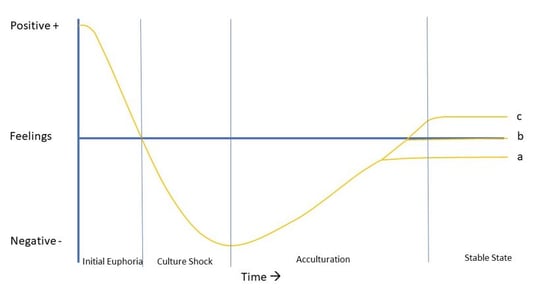Moving to an entirely new surrounding can be an exciting, scary and challenging process. An expat moving to a new culture oftentimes must forego many of the basic values that have been ever-present to them in their home and start from scratch. Values that would have been acquired early in life, that feel natural and instinctive. These values inform who we are and manifest themselves in many aspects of our daily lives. A foreigner may need to relearn the simplest things again but in the context of the new culture.
This is an incredibly exciting prospect for many expatriates as they may relish the challenge of learning and adapting to a new environment. However, acculturation studies have indicated that those positive feelings can decay exponentially in a short period of time.
This relearning process can lead to feelings of frustration toward the new surroundings. Miscommunications are rampant and difficulty understanding the local language becomes the new norm.
The traveler may slowly become accultured to their new home as they learn to function in their new environment. Adapting and adopting some of the local values and beginning a new local social life.
Finally, the individual may reach a stable state with their new way of life. This trend is visualized in the acculturation curve below:
 In this stable state the individual can remain feeling alienated if they do not successfully acculturate (a) or can maintain high levels of positive feelings, adjusting to the culture, becoming practically a native (c). This outcome is determined by the success of the adaptation to the new culture of this individual.
In this stable state the individual can remain feeling alienated if they do not successfully acculturate (a) or can maintain high levels of positive feelings, adjusting to the culture, becoming practically a native (c). This outcome is determined by the success of the adaptation to the new culture of this individual.
Culture shock can be so severe that assignments are ended prematurely, this shock extends beyond the expatriate themselves but also affects the family of the employee. A prematurely ended assignment also brings with it an immense cost to the business.
How can we help tackle this issue? – With interventions such as cultural and language training, hardship allowances and destination services support!
Soft benefits and training can support the individual in acquiring the necessary intercultural communication abilities that assist in the adoption of new social values and kickstart their new social life. In a study I recently came across I discovered that for every 1 dollar spent on mental health interventions there is a 5 dollar return on investment, with businesses reporting reduced absences and staff turnover. Mobility interventions are no different!
Understanding the costs of these interventions is critical when making the case for a move to your business. Our Assignment Cost Estimation tool quickly provides an overview of the costs of these soft benefits along with carefully researched income tax rates, taxability logic and relocation allowances into one tool.







